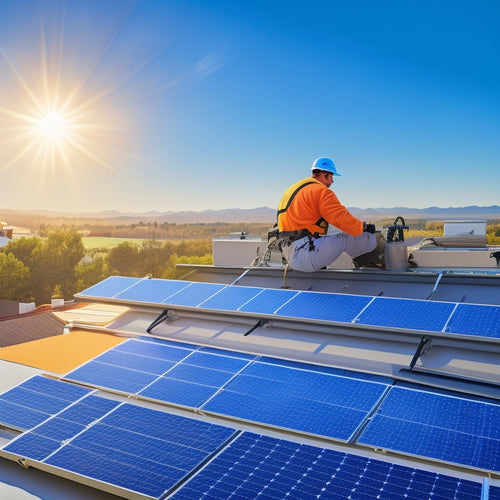
5 Things Affecting the Average Cost of Roof Solar Panels
Share
You'll find that the average cost of roof solar panels is influenced by five key factors, which can vary by thousands of dollars depending on your specific situation. The size and complexity of your system, panel efficiency and quality, the installation company and labor, your roof's size and orientation, and local incentives and permits all play a significant role in determining overall costs. Larger systems with high-efficiency panels can produce more energy, but also come with higher price tags. Meanwhile, reputable installation companies and local incentives can help offset expenses. As you consider these factors, you'll want to examine each one closely to maximize your savings and get the most out of your investment.
Key Takeaways
- System size and complexity influence cost, with larger systems producing more energy but incurring higher expenses.
- Panel efficiency and quality affect electricity generation, with high-efficiency panels being more expensive but producing more power.
- Installation company and labor costs significantly impact overall expenses, with reputable companies employing skilled laborers for quality installations.
- Roof size and orientation impact installation cost, with larger roofs generating more energy and steeper pitches increasing expenses.
- Local incentives and permits, such as financial rebates and tax credits, can lower upfront installation costs and reduce overall expenses.
System Size and Complexity
Typically, a residential solar panel system ranges from 3 to 10 kilowatts (kW), with the average system size being around 5-6 kW.
You'll want to evaluate the size of your system based on your energy needs and available roof space. A larger system will produce more energy, but it'll also be more expensive.
When determining the right system size for you, you'll need to assess the system components, including the number of panels, inverters, and mounting hardware.
The energy output of your system will depend on the quality and efficiency of these components, as well as factors like your roof's orientation and shading. A larger system will require more components, which can increase the overall cost.
A more complex system may also require additional features, such as energy storage or monitoring systems.
These features can add to the overall cost, but they can also provide more flexibility and control over your energy output.
Panel Efficiency and Quality
With solar panels, efficiency and quality play an essential role in determining how much electricity you can generate from the same amount of sunlight. The type of panel technology you choose affects your system's overall performance. High-efficiency panels, for instance, can produce more power per hour of sunlight, but they're typically more expensive.
On the other hand, lower-efficiency panels may be more budget-friendly, but they'll require more surface area to generate the same amount of electricity.
When evaluating panel quality, you should also consider maintenance costs. High-quality panels with a longer warranty period can reduce your maintenance expenses in the long run. Since they're built to last, you'll replace them less often, saving you money on replacement and repair costs.
Additionally, high-quality panels tend to degrade more slowly, ensuring a consistent energy output over their lifespan. As you weigh your options, remember that while more efficient and high-quality panels may come with a higher upfront cost, they can lead to greater long-term savings and a faster return on your investment.
Installation Company and Labor
You'll often find that the installation company and labor costs account for a significant portion of your overall solar panel expense. This is because a reputable installation company with skilled laborers can make a huge difference in the quality and efficiency of your solar panel system.
A company with a good installation reputation will typically have experienced professionals who can assess your roof's unique conditions and optimize the system's performance. Their labor proficiency will also guarantee that the installation is done safely and efficiently, reducing the risk of errors or accidents.
When comparing installation companies, look for certifications like NABCEP (North American Board of Certified Energy Practitioners) and check online reviews to gauge their reputation. Be wary of extremely low quotes, as they might compromise on labor proficiency or materials.
Roof Size and Orientation
Roof size and orientation greatly impact the average cost of roof solar panels, as they directly influence the number of panels required to meet your energy needs. A larger roof means more space for solar panels, which can increase the overall cost. However, a larger roof also means more energy can be generated, potentially offsetting the additional cost.
| Roof Size | Roof Pitch | Shading Factors |
|---|---|---|
| Small (<1,000 sqft) | Steep (>45°) | Heavy shading from trees or buildings |
| Medium (1,000-2,000 sqft) | Moderate (30-45°) | Partial shading from trees or buildings |
| Large (>2,000 sqft) | Shallow (<30°) | Little to no shading |
| Irregular shape | Complex (multiple angles) | Varies depending on orientation and obstacles |
| Obstructed | Flat (0-10°) | Heavy shading from surrounding structures |
The roof pitch also plays a significant role, as a steeper pitch can increase the cost of installation. Additionally, shading factors, such as trees or buildings, can reduce the energy output of your solar panels, affecting the overall cost. Understanding these factors will help you better estimate the average cost of roof solar panels for your specific situation.
Local Incentives and Permits
Your local government's incentives and permits can greatly impact the average cost of roof solar panels. Depending on where you live, you may be eligible for financial rebates or tax credits that can greatly lower the upfront cost of installation.
For instance, some states offer rebates for homeowners who install solar panels, while others provide property tax exemptions for solar-powered homes. Additionally, state regulations may also influence the cost of permits and inspections required for solar panel installation.
It's crucial to research the local incentives and permits in your area to maximize your savings. You can start by checking with your local government's website or contacting a solar panel professional who's familiar with the regulations in your region.
They can help you maneuver through the process and guarantee that you're taking advantage of all available incentives. By doing so, you can reduce the average cost of roof solar panels and make your investment more cost-effective.
Frequently Asked Questions
Do Solar Panels Work During Power Outages?
You'll find that solar panels don't work during power outages with traditional grid-tied systems, as they're designed to sync with the grid's frequency; however, you can opt for battery-backed systems to maintain solar panel efficiency during outages.
Can I Install Solar Panels on a Metal Roof?
Are you wondering if your metal roof is solar-friendly? You're in luck! You can install solar panels on a metal roof, leveraging its benefits like durability and water resistance, but consider unique installation requirements, like specialized fasteners and sealed penetrations.
How Long Does It Take to Install Solar Panels?
You'll be pleased to know that the installation timeline typically ranges from a few days to several weeks, depending on the complexity of the installation process, which involves evaluating your roof, preparing the site, and mounting the panels.
Are Solar Panels Affected by Tree Shade or Debris?
You might think solar panels are a no-go if you've got tree coverage, but don't worry, you can still capture the sun's power! Debris accumulation can reduce efficiency, but a well-designed system with regular cleaning can minimize the impact.
Can I Finance Solar Panels Through My Utility Company?
You can investigate utility financing options for solar panels, which often offer competitive rates and flexible repayment terms, while also benefiting from solar incentives like net metering and tax credits that reduce the upfront cost.
Conclusion
You've considered the factors that impact the average cost of roof solar panels. System size and complexity, panel efficiency and quality, installation company and labor, roof size and orientation, and local incentives and permits all play a role. By assessing these elements, you'll get a more accurate estimate for your solar panel investment. Now, you can make an informed decision, balancing your budget with your commitment to renewable energy.
Related Posts
-

Top 10 DIY Conversion Kit Reviews and Tips
You're taking the first step towards electrifying your ride, and with the right DIY conversion kit, you'll be cruisin...
-

10 Best Ways to Purify Urban Air With EVS
You're looking for ways to purify urban air with Electric Vehicles (EVs). You can start by incorporating EVS Air Filt...
-

3 Essential Steps for Solar Electricity Installation
To guarantee a successful solar electricity installation, you'll need to follow three essential steps. First, assess ...


